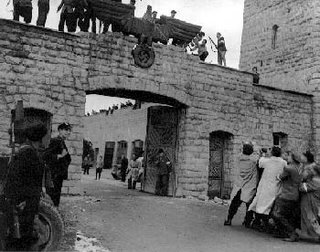Central European Musical And Humanistic Education And Culture Before And During The Theresienstadt Nazi Death-Transit Camp
Arnold Schoenberg wrote: "When Alban Berg came to me in 1904, he was a very tall youngster and extremely timid. But when he showed me his compositions -- songs in a style between Hugo Wolf and Johannes Brahms -- I recognized at once that he had real talent... two things emerged clearly even from Berg's earliest compositions: First, that music was to him a language, and that he really expressed himself in that language; and second, the overflowing warmth of feeling... Like all those young people at the time, he steeped himself in music, lived in music. He went to all operas and concerts and learned the repertory; he played four-hand piano at home and learned to read scores. He was enthusiastic and unbiased, receptive to everything beautiful, old or new, in music, literature, painting, sculpture, theatre, and opera. It was a pleasure to teach him. He wanted a style more in accordance with the times, which would reflect his own developing personality. Unshakable conscientiousness and reliability were very characteristic of Berg. Whatever he undertook, he executed with painful exactitude."
*
Viktor Ullmann wrote: " For me Theresienstadt has been, and remains, an education in form. Previously, when one did not feel the weight and pressure of material life, it was easy to create beautiful forms... Here, true mastery lies in seeing, with Schiller, that the secret of art-work lies in the eradication of matter through form: which is presumably, indeed, the mission of man altogether, not only of aesthetic man but also of ethical man... I would stress that Theresienstadt has helped, not hindered, me in my musical work, that we certainly did not sit down by the waters of Babylon and weep, and that our desire for culture was matched by our desire for life..."
*
Arnold Schoenberg, of course, was the composer of the opera 'Moses und Aron'; Alban Berg was the composer of the operas 'Wozzeck' and 'Lulu'; and Viktor Ullmann was the composer of the death-transit camp chamber opera 'The Emperor of Atlantis, or The Refusal of Death'.
http://www.ushmm.org/wlc/en/index.php?ModuleId=10005424
http://www.mauthausen-memorial.at/index_open.php
http://www.jewishgen.org/forgottencamps/Camps/
MauthausenEng.html
http://www.auschwitz-muzeum.oswiecim.pl/html
/eng/start/index.php

The liberation of the Mauthausen, Austria death-camp by Allied forces in 1945.
Photo credit: via www.wiesenthal.com With thanks
*
Viktor Ullmann wrote: " For me Theresienstadt has been, and remains, an education in form. Previously, when one did not feel the weight and pressure of material life, it was easy to create beautiful forms... Here, true mastery lies in seeing, with Schiller, that the secret of art-work lies in the eradication of matter through form: which is presumably, indeed, the mission of man altogether, not only of aesthetic man but also of ethical man... I would stress that Theresienstadt has helped, not hindered, me in my musical work, that we certainly did not sit down by the waters of Babylon and weep, and that our desire for culture was matched by our desire for life..."
*
Arnold Schoenberg, of course, was the composer of the opera 'Moses und Aron'; Alban Berg was the composer of the operas 'Wozzeck' and 'Lulu'; and Viktor Ullmann was the composer of the death-transit camp chamber opera 'The Emperor of Atlantis, or The Refusal of Death'.
http://www.ushmm.org/wlc/en/index.php?ModuleId=10005424
http://www.mauthausen-memorial.at/index_open.php
http://www.jewishgen.org/forgottencamps/Camps/
MauthausenEng.html
http://www.auschwitz-muzeum.oswiecim.pl/html
/eng/start/index.php

The liberation of the Mauthausen, Austria death-camp by Allied forces in 1945.
Photo credit: via www.wiesenthal.com With thanks


0 Comments:
Post a Comment
<< Home